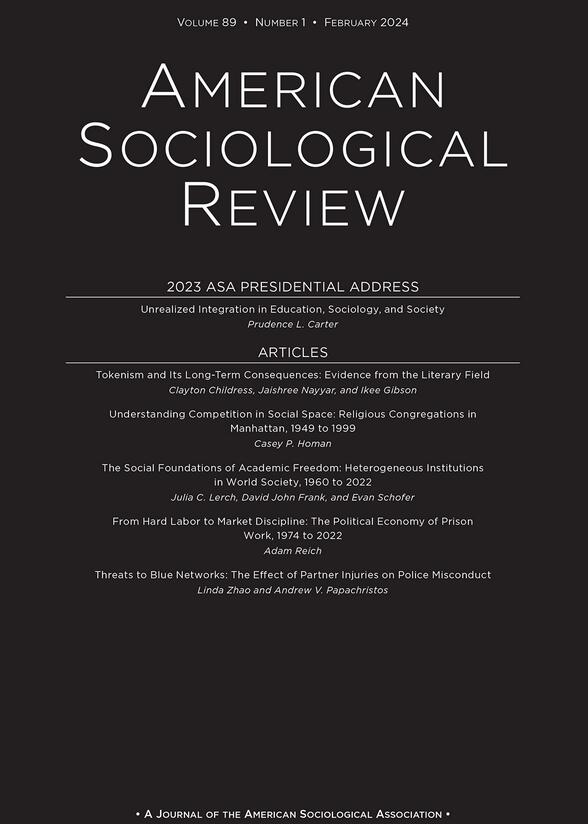乌干达学生论文的制作和销售道德化
IF 7.1
1区 社会学
Q1 SOCIOLOGY
引用次数: 3
摘要
社会学家已经证明,对市场交换的道德理解在不同的历史时期和制度背景下会有所不同,但他们很少关注生产者的道德框架如何根据他们在市场和制度中的不平等地位而变化。我们采用访谈和人种学观察的方法,考察了乌干达两所顶尖大学周围向学生出售学术作品的研究商店这个充满活力的市场。我们确定了三组研究人员——知识生产者、企业家和教育者——他们构建了不同的职业身份和他们行业的道德理由,并相应地调整了他们的市场行为。我们证明,这些身份和道德框架反映了制度背景和研究人员在这个非法市场中占据的社会阶级地位之间的相互作用。知识生产者和企业家都经历过一种与各自的制度文化“契合”的感觉,但前者现在认为他们的工作是对研究理想的妥协,而后者则利用了他们认为的一个破碎的体系。在这两所学校都处于劣势的教育工作者,提出了一个框架,反对占主导地位的学校文化,同情表现不佳的学生。这种方法阐明了制度背景和其中的个人阶级地位如何影响生产者的道德框架,从而导致市场分化。本文章由计算机程序翻译,如有差异,请以英文原文为准。
Moralizing the Production and Sale of Student Papers in Uganda
Sociologists have shown that moral understandings of market exchanges can differ between historical periods and institutional settings, but they have paid less attention to how producers’ moral frameworks vary depending on their unequal positions within both markets and institutions. We use interviews and ethnographic observations to examine the vibrant market of research shops selling academic work to students around two of Uganda’s top universities. We identify three groups of researchers—Knowledge Producers, Entrepreneurs, and Educators—who construct different professional identities and moral justifications of their trade, and who orient their market action accordingly. We demonstrate that these identities and moral frameworks reflect an interplay between the institutional contexts and the social class positions that researchers occupy within this illicit market. Knowledge Producers and Entrepreneurs both experienced a sense of “fit” with their respective institutional cultures, but the former now see their work as compromising ideals of research, whereas the latter capitalize on what they view as a broken system. Educators, disadvantaged at both institutions, articulate a framework countering the dominant institutional cultures and sympathetic to underperforming students. This approach illuminates how institutional contexts and individual class positions within them influence producers’ moral frameworks, leading to differentiation of the market.
求助全文
通过发布文献求助,成功后即可免费获取论文全文。
去求助
来源期刊

American Sociological Review
SOCIOLOGY-
CiteScore
13.30
自引率
3.30%
发文量
35
期刊介绍:
The American Sociological Association (ASA) is a non-profit membership association established in 1905. Its mission is to advance sociology as a scientific discipline and profession that serves the public good. ASA is comprised of approximately 12,000 members including faculty members, researchers, practitioners, and students in the field of sociology. Roughly 20% of the members work in government, business, or non-profit organizations.
One of ASA's primary endeavors is the publication and dissemination of important sociological research. To this end, they founded the American Sociological Review (ASR) in 1936. ASR is the flagship journal of the association and publishes original works that are of general interest and contribute to the advancement of sociology. The journal seeks to publish new theoretical developments, research results that enhance our understanding of fundamental social processes, and significant methodological innovations. ASR welcomes submissions from all areas of sociology, placing an emphasis on exceptional quality.
Aside from ASR, ASA also publishes 14 professional journals and magazines. Additionally, they organize an annual meeting that attracts over 6,000 participants. ASA's membership consists of scholars, professionals, and students dedicated to the study and application of sociology in various domains of society.
 求助内容:
求助内容: 应助结果提醒方式:
应助结果提醒方式:


